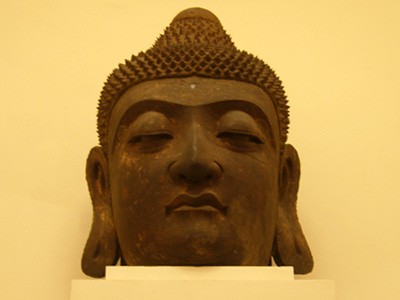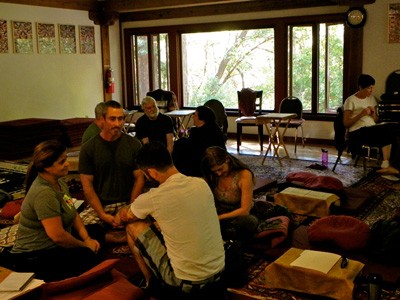“Five Faultless Gifts” and “Five Blessings”

These verses are from the Sutra (discourses), one of the three divisions of the Tripitaka, the Three Baskets of the Buddha’s teachings.
Five Faultless Gifts
There are these five gifts, five great gifts — original, long-standing, traditional, ancient, unadulterated, unadulterated from the beginning — that are not open to suspicion, will never be open to suspicion, and are not faulted by knowledgeable contemplatives and brahmans. Which five?
There is the case where a disciple of the noble ones, abandoning the taking of life, abstains from taking life. In doing so, he gives freedom from danger, freedom from animosity, freedom from oppression to limitless numbers of beings. In giving freedom from danger, freedom from animosity, freedom from oppression to limitless numbers of beings, he gains a share in limitless freedom from danger, freedom from animosity, and freedom from oppression. This is the first gift, the first great gift — original, long-standing, traditional, ancient, unadulterated, unadulterated from the beginning — that is not open to suspicion, will never be open to suspicion, and is not faulted by knowledgeable contemplatives and brahmans…
Furthermore, abandoning taking what is not given (stealing), the disciple of the noble ones abstains from taking what is not given. In doing so, he gives freedom from danger, freedom from animosity, freedom from oppression to limitless numbers of beings. In giving freedom from danger, freedom from animosity, freedom from oppression to limitless numbers of beings, he gains a share in limitless freedom from danger, freedom from animosity, and freedom from oppression. This is the second gift…
Furthermore, abandoning illicit sex, the disciple of the noble ones abstains from illicit sex. In doing so, he gives freedom from danger, freedom from animosity, freedom from oppression to limitless numbers of beings. In giving freedom from danger, freedom from animosity, freedom from oppression to limitless numbers of beings, he gains a share in limitless freedom from danger, freedom from animosity, and freedom from oppression. This is the third gift…
Furthermore, abandoning lying, the disciple of the noble ones abstains from lying. In doing so, he gives freedom from danger, freedom from animosity, freedom from oppression to limitless numbers of beings. In giving freedom from danger, freedom from animosity, freedom from oppression to limitless numbers of beings, he gains a share in limitless freedom from danger, freedom from animosity, and freedom from oppression. This is the fourth gift…
Furthermore, abandoning the use of intoxicants, the disciple of the noble ones abstains from taking intoxicants. In doing so, he gives freedom from danger, freedom from animosity, freedom from oppression to limitless numbers of beings. In giving freedom from danger, freedom from animosity, freedom from oppression to limitless numbers of beings, he gains a share in limitless freedom from danger, freedom from animosity, and freedom from oppression. This is the fifth gift, the fifth great gift — original, long-standing, traditional, ancient, unadulterated, unadulterated from the beginning — that is not open to suspicion, will never be open to suspicion, and is not faulted by knowledgeable contemplatives and brahmans. And this is the eighth reward of merit, reward of skillfulness, nourishment of happiness, celestial, resulting in happiness, leading to heaven, leading to what is desirable, pleasurable, and appealing; to welfare and to happiness.
— Anguttara Nikaya 8.39
Five Blessings
Five blessings, householders, accrue to the righteous person through his practice of virtue: great increase of wealth through his diligence; a favorable reputation; a confident deportment, without timidity, in every society, be it that of nobles, brahmins, householders, or ascetics; a serene death; and, at the breaking up of the body after death, rebirth in a happy state, in a heavenly world.
— Digha Nikaya 16
© 2015 Access to Insight. Five Faultless Gifts and Five Blessings edited by Access to Insight and licensed under Creative Commons Attribution-NonCommercial 4.0 International. Featured image © stock.adobe.com.
Venerable Thubten Chodron
Venerable Chodron emphasizes the practical application of Buddha’s teachings in our daily lives and is especially skilled at explaining them in ways easily understood and practiced by Westerners. She is well known for her warm, humorous, and lucid teachings. She was ordained as a Buddhist nun in 1977 by Kyabje Ling Rinpoche in Dharamsala, India, and in 1986 she received bhikshuni (full) ordination in Taiwan. Read her full bio.


